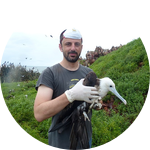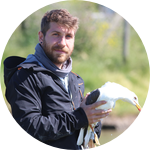About This Project
A novel herpesvirus likely indigenous to the magnificent frigatebird (Fregata magnificens) has been linked to episodes of mass mortality of chicks from the Grand Connétable Nature Reserve, a small island in French Guiana. In this colony, around 90% of chicks die each year after showing clinical signs of infection. We hypothesize that these episodes of mass juvenile mortality result from environmental pollutants altering the physiology and parental behaviour of adult frigatebirds.
Ask the Scientists
Join The DiscussionWhat is the context of this research?
The emergence of novel viruses is an issue of growing concern. However, new disease outbreaks can also flare up from common viruses. Exposure to sources of environmental stress (e.g., food shortage, pollutants) can decrease individual animals’ immunocompetence, facilitating viral activation and leading to clinical symptoms of viral diseases.
French Guiana is experiencing a dramatic increase in mercury contamination as a result of mining activities. This raises the important question of whether mercury is one of the factors promoting the development of disease in frigatebird chicks exposed to the herpesvirus. Chemical contaminants like mercury can interfere with the function of the hormone prolactin, that regulates parental care behavior in birds.
What is the significance of this project?
Mercury exposure is a global threat to humans and wildlife. To date, however, the relationship between mercury and disease outbreaks in wild animal populations has received very little attention.
This poorly covered research topic clearly deserves more investigation given the likely climate change-related increase in infectious disease occurrence, and projections suggesting that the amount of mercury in fish may double by 2050.
These factors represent a long-term threat to wildlife, making it increasingly critical to identify the potential connections between mercury and viral disease. This project will represent a fundamental contribution to our understanding of how environmental change can trigger infectious disease outbreaks in wild animal populations.
What are the goals of the project?
Our goal is to deploy GPS tags on adult males and females over several months to monitor their breeding and post-breeding behaviors in relation to their blood mercury levels.
We hypothesized that adult birds with a higher mercury load:
i) provide less parental care, and do not provide sufficient food for their chicks, and ii) abandon the chick earlier, making the chick more susceptible to the disease.
We will also be able to i) assess the impact of the virus on the mortality rate of adults and ii) to identify other populations having a strong exchange of individuals with French Guiana, which could increase the spread of the virus and ultimately put multiple populations at risk.
Budget
Some of the expenses related to the purchase of additional GPS loggers, fieldwork expenses, travel and accommodation expenses, and for the shipment of the biological samples, have already been covered by Wild Animal Initiative, by the National Museum of Natural History (MNHN) of Paris, and by a European grant.
If we can raise more than the full amount, we will i) buy more GPS loggers to increase our data collection; and ii) be able to visit neighboring frigatebird colonies to understand how rapidly the virus is spreading.
Endorsed by
 Project Timeline
Project Timeline
This work will begin October-November 2021, during the breeding season of frigatebirds. We will deploy GPS tracks on 15 females and 15 adult males.
We will additionally collect a blood sample and feathers samples to be analysed for mercury at the LIttoral Environnement et Sociétés (University of La Rochelle, France).
GPS data will be continuously collected for several months, when they will be used to answer our scientific hypotheses related to the parental care behaviour.
May 31, 2021
Project Launched
Sep 01, 2021
Project begins (field work preparation)
Oct 17, 2021
Field work begins
Feb 01, 2022
Analysis of mercury in biological samples
Jul 01, 2022
Analysis of data on parental care behaviour
Meet the Team
Team Bio
Prof. David Costantini (MNHN). My mentor and project supervisor. Expert of physiology, behaviour and life-history strategies of wild animals.
Dr. Olivier Chastel (CEBC). Expert on animal tracking and parental behaviour of seabirds.
Prof. Paco Bustamante (LIENSs). Expert of ecotoxicology. His team will carry out the analyses of mercury.
GEPOG Guyane. Local non-profit organization that provides logistic support and access to the study site.
Manrico Sebastiano
I am a post-doctoral researcher passionate about wildlife conservation. At the National Museum of Natural History (MNHN) of Paris, I study the effect of environmental stress with a particular focus on contaminant exposure on the physiology of wildlife.
After high school I had only one thing in mind: to dedicate my life to the study of animals. I was really undecided whether to become a vet or study biology and ecology, which was my final choice. This choice changed my life.
The professors at my university ("La Sapienza" University of Rome) inspired me a lot and the motivation to become like them grew. At the end of my university course, I had the opportunity to meet Prof. David Costantini, with whom we wrote a PhD project on the causes and consequences of a viral disease that affected a population of frigatebirds in South America.
During my PhD at the University of Antwerp (Belgium) I became interested in the relationship between environmental stressors and seabird physiology, to the understanding of the mechanisms and threats that lead to species extinction, and to the development of methods that can help with the conservation and management of species.
This interest became a passion during my two years as a post-doctoral researcher at the Centre d'Etudes Biologiques de Chizè (France), studying the effect of environmental contaminants on the physiology and behaviour of seabirds in Arctic regions.
After working on this same frigatebird population for more than 4 years, I know the population very well and I also have an ongoing collaboration with other scientists and institutions to reach the goals of the project. My actual research profile and experiences, and my motivations, place me in a favourable condition for the success of this project.
Additional Information
The frigatebird population in French Guiana is considered one of the most important colonies of Magnificent frigatebirds, because it represents the genetic bridge among Caribbean and Brazilian colonies. This project has thus an extra value in terms of conservation.
By sharing the results with the local environmental protection organizations, this project has the potential to lead to stricter regulatory measures that would limit the emission of mercury into the environment.
Project Backers
- 101Backers
- 100%Funded
- $5,901Total Donations
- $51.00Average Donation

